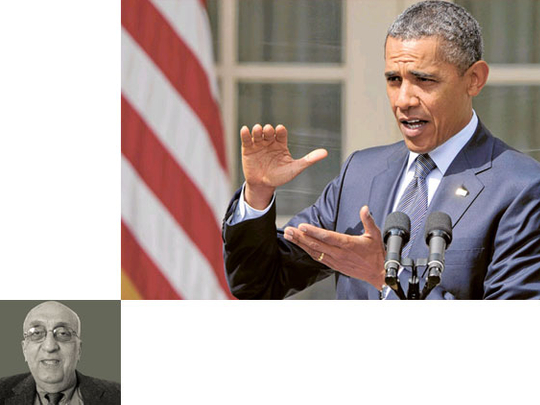
Much to his credit, no one, not an Arab leader or anyone else for that matter, has been able to simultaneously rattle both Washington and Tel Aviv as Palestinian President Mahmoud Abbas has done all week long in his determination to submit tomorrow an application for full Palestinian membership at the United Nations.
His back to the wall, the spirited Abbas believes he has no other choice since his homeland has been under total Israeli rule for 63 years and his partitioned portion — the West Bank, the Gaza Strip and occupied east Jerusalem — under occupation for 44 years.
And all interventions by big or small powers have not been able to bring about a fair settlement with Israel. The US, the arch-protector of Israel, has miserably failed despite repeated promises, the latest offered by President Barack Obama two years ago.
Even the so-called Quartet, comprising the US, Russia, Europe and the UN, since 2002 has been unable to help guide the Palestinian-Israeli negotiations — or define acceptable parameters for the negotiations in order to start the ball rolling.
The uproar over Abbas’ upcoming and seemingly earth-shaking action has been dismissed in the West as worthless or ineffective. If so, why all this fuss in the US and Israel and among a few other UN member states? If anything, this stalemate over Palestinian recognition underlines the point that the US can no longer serve as an honest mediator, since its well-meaning president is much in need of popular and financial support for his re-election, particularly from the American Jewish community which is now being raided by the Republican Party hopefuls.
The latest poll has shown that Obama has only about 60 per cent support within the Jewish community, compared to 80 per cent when he ran for office.
Domestic pressure
Former congressman Mitt Romney, the Republican front-runner, has recently chastised the president, declaring: “President Obama has thrown Israel under the bus. He has also violated a first principle of American policy, which is to stand firm by our friends.”
An American Jewish group, the Emergency Committee for Israel, followed suit with a full-page advertisement saying: ‘Tell President Obama: Enough. It’s time to stand with Israel’.
The other side of the coin came in several columns written by prominent American Jews, including top journalists, who have been critical of Israeli policies, a turnaround that should encourage American politicians not to be so submissive to Israeli dictates.
Thomas L. Friedman of the New York Times, writes: “I’ve never been more worried about Israel’s future. The crumbling of Israel’s security — the peace with Egypt, the stability of Syria and the friendship of Turkey and Jordan — coupled with the most diplomatically inept and strategically incompetent government in Israel’s history have put Israel in a very dangerous situation.”
He goes on to say that “... Israel today is giving its friends — and President Obama’s one of them — nothing to defend it with,” adding, “this has left the US fed up with Israel’s leadership but a hostage to its ineptitude, because the powerful pro-Israel lobby in an election season can force the administration to defend Israel at the UN even when it knows Israel is pursuing policies not in its own interest or America’s”.
He continues: “One can only hope that the Israeli people will recognise this before this govenment plunges Israel into deeper global isolation and drags America along with it.”
Another prominent American Jewish writer, M. J. Rosenberg, a former director of Policy Analysis for Israel Policy Forum, described as an American Jewish organisation that works for a two-state solution to the Israeli-Palestinian conflict, was equally critical.
In a commentary titled Shooting Ourselves in the Foot at the UN,” he writes, “Some of the opposition [to a UN resolution that would grant the Palestinians their long-sought state] comes from the [Israeli] lobby and its congressional cutouts who are dedicated to preserving the status quo [i.e. the occupation]. The Obama administration surely has a far more nuanced position but it is terrified at the prospects of challenging the lobby as it faces a tough re-election campaign.”
A welcome development has been the counter-arguments presented by Arab-Americans in the country’s media like Foreign Affairs, think-tanks like the Council on Foreign Relations, and Sunday talk shows.
Among those interviewed were Dr Rashid Khalidi of Columbia University, Dr. Ziad Asali and Hussein Ibish, both of the American Task Force on Palestine.
Equally significant has been the ability of the Washington-based Institute for Palestine Studies, now run by Raphael Calis, a former executive editor of United Press International, to raise its profile in the US, as evident when its Amman-based analyst, Mouin Rabbani was interviewed repeatedly by the national media — a step that should be copied by other Arab American institutions.
George S. Hishmeh is a Washington-based columnist. He can be contacted at ghishmeh@gulfnews.com








